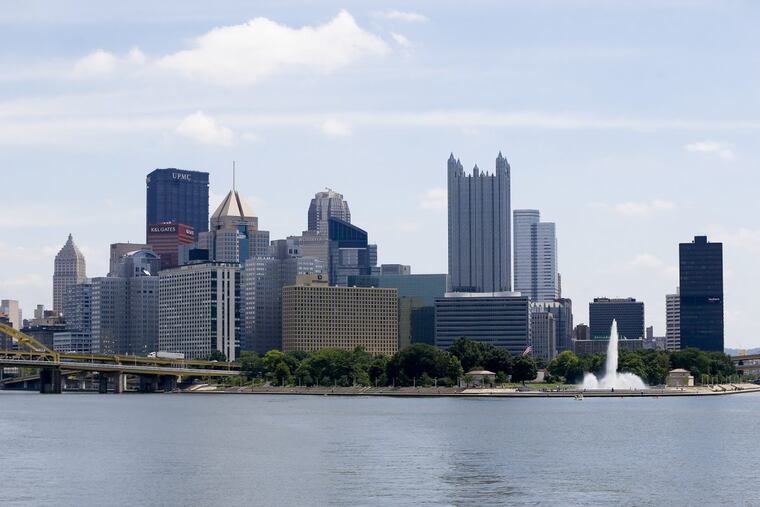Reversing the flow of the Laurel Pipeline hurts Philly and Pittsburgh | Opinion
It's critical for the Pennsylvania Public Utility Commission to reject a proposal to reverse the flow of the Laurel Pipeline.

The devastation of hurricanes Harvey and Irma have wreaked havoc on millions of families, businesses and communities. It's times like these that the Pittsburgh region is happy to know we can count on Philadelphia.
Let me explain.
What has gone under-reported are the fuel shortages that have occurred as a result of these historic storms that have ravaged Florida and Texas. Natural disasters like these are just one of many reasons Pennsylvania must continue to have multiple options for the delivery of petroleum products from different geographic markets. We all take the availability of fuel for granted, but a shortage would cripple our local economy.
Fortunately, the Pittsburgh region currently enjoys the option to receive petroleum products from multiple regions, including Greater Philadelphia and the Midwest. If pipeline supply from the Midwest suffers a disruption, the Pittsburgh region would continue to receive petroleum products from Philadelphia, and vice versa. That flexibility benefits Pittsburgh consumers, and has for 60 years.
That's just one reason why it's critical for the Pennsylvania Public Utility Commission to reject a proposal from Texas-based Buckeye Partners to reverse the flow of the Laurel Pipeline. The Laurel Pipeline has delivered gasoline, diesel fuel and other products from sources in the East, including Philadelphia-based refineries, to the Pittsburgh region and other points in western Pennsylvania.
If the PUC grants this reversal, the Pittsburgh area will become shut off from Philadelphia and will be more vulnerable to a fuel shortage, while Buckeye earns a much fatter bottom line. To make matters worse, Pennsylvania would virtually lose all control over a pipeline that extends more than 200 miles through countless communities.
What do consumers in the Pittsburgh region get if Buckeye succeeds and cuts off our friends in Philadelphia? Higher costs that will be passed on at the pump in Pittsburgh, while hundreds of jobs at those Philadelphia refineries will be in jeopardy.
Currently, the Pittsburgh market receives approximately 110,000 barrels of petroleum products per day, enough to fuel more than 300,000 cars. Most of the barrels are delivered on the Laurel Pipeline from the East under the Pennsylvania PUC's jurisdiction.
If Buckeye receives permission to reverse the flow, Buckeye would collect more than four times the revenue it currently collects under Pennsylvania PUC rates. Who do you think ends up paying for the higher tariff? In the end, this massive increase will be passed on to gasoline and diesel consumers in the Pittsburgh region.
Having the federal government, instead of Pennsylvania, regulate future decisions on Buckeye could lead to even higher profits because Buckeye is able to increase tariffs at a much faster rate under federal government regulation than under the PUC. In fact, it's already happening. Over the last five years, the federal government has allowed Buckeye to increase tariffs nearly 75 percent from the Midwest. Eliminating pipeline flow from the East will virtually eliminate all tariff control that helps control costs for Pennsylvanians.
In other words, if the PUC grants Buckeye's application, the only winners will be Buckeye and certain out-of-state suppliers that would displace Philadelphia refineries. The losers will be all of us in Pennsylvania.
Looking at the areas affected by the hurricanes right now, it's hard not to feel even worse when you think of all the disruptions they are experiencing related to access to fuel – and the added burden that is placing on countless people trying to rebuild their lives. Folks in those markets certainly do not have the options that people in the Pittsburgh region have today.
There are so many reasons why the Pennsylvania PUC should reject this effort by Buckeye Partners, but really it comes down to this:
Buckeye and its Midwest refinery partners will virtually have a monopoly on the Pittsburgh market and far fewer controls on increasing tariffs on every single barrel that is piped into Pennsylvania. And the people who can least afford higher prices will end up paying for it.
Greg Johnston is the director of terminal operations for Gulf Oil. He is based in Pittsburgh. Gulf has invested more than $110 million into Pittsburgh region over the past five years, and owns and operates several terminals in the Pittsburgh region.